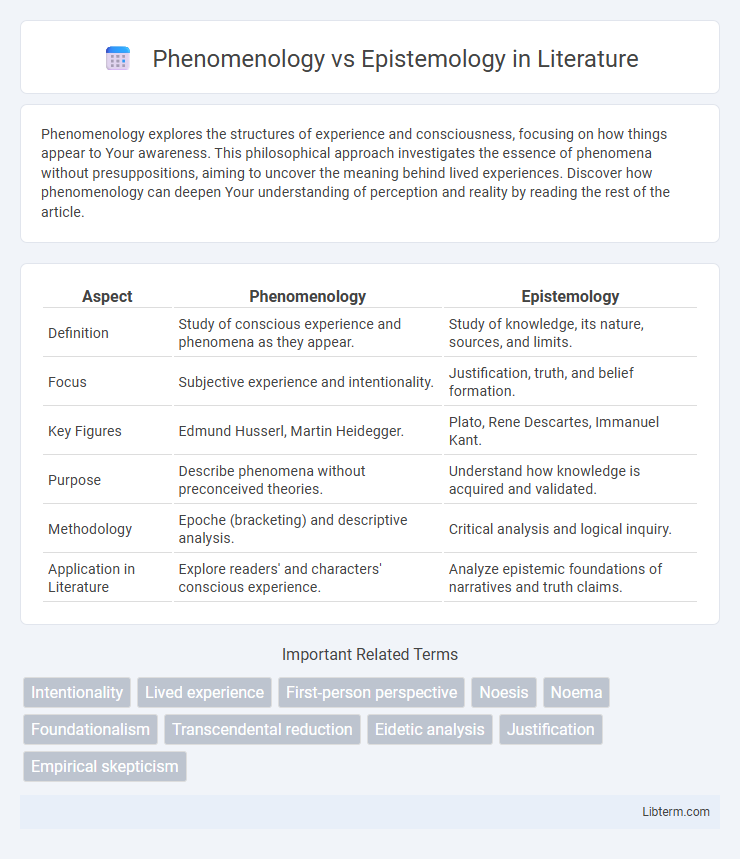Phenomenology explores the structures of experience and consciousness, focusing on how things appear to Your awareness. This philosophical approach investigates the essence of phenomena without presuppositions, aiming to uncover the meaning behind lived experiences. Discover how phenomenology can deepen Your understanding of perception and reality by reading the rest of the article.
Table of Comparison
| Aspect | Phenomenology | Epistemology |
|---|---|---|
| Definition | Study of conscious experience and phenomena as they appear. | Study of knowledge, its nature, sources, and limits. |
| Focus | Subjective experience and intentionality. | Justification, truth, and belief formation. |
| Key Figures | Edmund Husserl, Martin Heidegger. | Plato, Rene Descartes, Immanuel Kant. |
| Purpose | Describe phenomena without preconceived theories. | Understand how knowledge is acquired and validated. |
| Methodology | Epoche (bracketing) and descriptive analysis. | Critical analysis and logical inquiry. |
| Application in Literature | Explore readers' and characters' conscious experience. | Analyze epistemic foundations of narratives and truth claims. |
Understanding Phenomenology: An Overview
Phenomenology centers on studying conscious experiences from a first-person perspective, emphasizing the structure and essence of phenomena as they appear to individuals. It explores how meaning is constituted through intentionality, revealing the subjective dimensions of perception and cognition. This approach contrasts with epistemology's focus on the nature and scope of knowledge by prioritizing lived experience over abstract justification or truth claims.
Defining Epistemology: Foundations and Focus
Epistemology centers on the study of knowledge, investigating its origins, nature, scope, and limits to understand how we acquire and justify beliefs. It explores foundational questions about the sources of knowledge, the structure of justification, and the criteria for truth and belief reliability. Unlike phenomenology, which examines conscious experience, epistemology emphasizes the theoretical underpinnings and validation of knowledge itself.
Core Philosophical Questions in Phenomenology
Phenomenology centers on the core philosophical questions of how consciousness structures experience and the essence of phenomena as they manifest to perception. It investigates the intentionality of consciousness, emphasizing the direct examination of subjective experience without presuppositions. Epistemology, in contrast, focuses on the nature, scope, and limits of knowledge, addressing questions about justification, belief, and truth.
Key Concepts in Epistemology
Epistemology centers on key concepts such as knowledge, belief, justification, and truth, exploring how individuals acquire, validate, and understand information. It investigates the nature and scope of knowledge, addressing questions about what counts as justified belief and the limits of human understanding. Unlike phenomenology, which focuses on conscious experience and perception, epistemology emphasizes the conditions and structures that make knowledge possible.
Historical Development: Phenomenology vs Epistemology
Phenomenology, pioneered by Edmund Husserl in the early 20th century, developed as a philosophical method focused on the structures of consciousness and direct experience, shaping modern existential and hermeneutic traditions. Epistemology, tracing back to ancient philosophers such as Plato and Aristotle, evolved through rationalist and empiricist schools in the 17th and 18th centuries, centering on theories of knowledge, belief justification, and the nature of truth. The historical development of phenomenology and epistemology reflects a shift from abstract knowledge theories to descriptive analyses of experience and consciousness in contemporary philosophy.
Major Thinkers and Influences in Both Fields
Phenomenology, pioneered by Edmund Husserl, centers on the direct investigation of experience and consciousness, influencing thinkers like Martin Heidegger and Maurice Merleau-Ponty who expanded its focus to existential and embodied dimensions. Epistemology, with roots in philosophers such as Rene Descartes and John Locke, explores the nature and scope of knowledge, shaping the work of Immanuel Kant, who bridged rationalism and empiricism, and contemporary figures like Alvin Goldman in the domain of social epistemology. Both fields profoundly impact philosophy, where phenomenology informs studies of perception and intentionality, while epistemology addresses justification, belief, and the limits of human understanding.
Methodologies: Examining Experience and Knowledge
Phenomenology primarily employs methods like epoche and intentional analysis to explore the structures of lived experience and consciousness. Epistemology uses logical reasoning and empirical investigation to analyze the nature, scope, and justification of knowledge claims. Both methodologies intersect by scrutinizing how experience informs knowledge, yet they differ as phenomenology emphasizes subjective experience while epistemology focuses on objective validation.
Differences in Approach: Subjectivity vs Objectivity
Phenomenology centers on exploring human experiences from a first-person perspective, emphasizing subjective consciousness and intentionality. Epistemology investigates the nature and scope of knowledge, prioritizing objective analysis and justification of beliefs. The key distinction lies in phenomenology's focus on understanding personal meaning, while epistemology seeks to establish universally valid knowledge.
Intersection and Interplay between Phenomenology and Epistemology
Phenomenology and epistemology intersect through their shared focus on the nature and structure of human experience and knowledge acquisition. Phenomenology examines the lived experience and the way phenomena present themselves to consciousness, which provides foundational insights for epistemological inquiries into the origin, scope, and limits of knowledge. This interplay highlights how phenomenological descriptions inform epistemological frameworks by emphasizing subjective perception as a crucial component in understanding knowledge validation and justification.
Contemporary Relevance and Applications
Phenomenology offers contemporary relevance by emphasizing lived experience and subjective perception, crucial in fields like psychology, healthcare, and human-computer interaction where understanding individual consciousness enhances practice and design. Epistemology remains foundational for evaluating knowledge claims, shaping methodologies in scientific research, artificial intelligence, and education by addressing the nature, scope, and justification of knowledge. Together, these disciplines inform interdisciplinary approaches that balance experiential insights with rigorous knowledge validation in modern knowledge production and application.
Phenomenology Infographic

 libterm.com
libterm.com